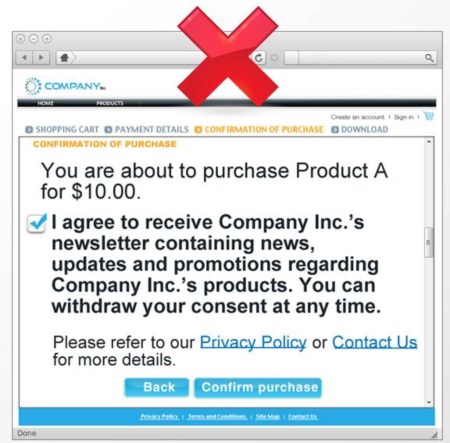Corporations and electronic marketers won’t be able to pull any tricks to get around the government’s anti-spam law, the federal telecom regulator has made it clear.
In guidelines released Wednesday the Canadian Radio-television and Telecommunications Commission (CRTC) said organizations must get consumers to physically approve receiving their commercial messages on PCs, tablets and smart phones or they will be considered illegal spam.
So-called toggling strategies – sending consumers a permission message with a check-mark already filled in that the person agrees to receive communications – won’t be accepted.
The idea of the toggle is if the consumer does nothing it signals agreement to receive messages — in other words, the consumer has to uncheck the mark to stop getting electronic messages. It’s also called an opt-out consent.
Marketers hope that consumers miss the message, click on OK and therefore automatically agree to keep getting email or SMS message from the sender.

The guidelines relate to the government’s anti-spam legislation, which was approved in December, 2010 but is expected to come into effect next year.
The guidelines issued Wednesday are to help organizations comply with the law, which requires businesses get express consent from consumers before sending promotional email and other commercial messages.
The regulator said this is but the first of a series of guidelines it will issue.
Although the CRTC has primary jurisdiction, the federal Competition Bureau and the Office of the Privacy Commissioner also have powers to enforce the law.
The law prohibits sends of commercial electronic messages without express or implied consent of receivers.
Earlier this year the commission set out regulations describing the information organizations have to include in messages to get consumer consent. They includes a way for consumers to unsubscribe from communications.
In the guidelines the commission said an approved mechanism can be a link in an email to a Web page where a consumer can unsubscribe from receiving all or some types of commerica messages from the sender.
For short message services (SMS), the user should have the choice between replying to the SMS message with the word “STOP” or “Unsubscribe” and clicking on a link that will take the user to a web page where he or she can unsubscribe from receiving all or some types of CEMs from the sender, the commission said.
“We are committed to protecting Canadians from the harm caused by spam and other electronic threats,” Andrea Rosen, the CRTC’s chief compliance and enforcement officer said in a release accompanying the guidelines. “
“Canadian businesses, both large and small, are strongly encouraged to familiarize themselves with the law, the regulations and the information bulletins. Even though the law is not yet in force, businesses should start preparing now by updating their practices and developing compliance procedures.”